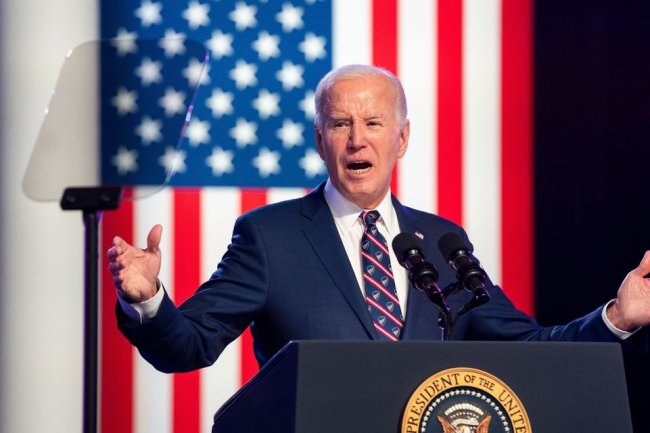Biden and the OECD’s Taxation Without Representation
Congress refused to enact the Pillar 2 agreement that requires all countries to tax large corporations. By David M. Schizer July 2, 2023 3:38 pm ET OECD members and minister pose for a photo in Paris, June 9, 2022. Photo: filippo attili/chigi palace pres/Shutterstock The Declaration of Independence complained that Britain was “imposing Taxes on us without our Consent,” and Americans rallied around the idea of “no taxation without representation.” They wanted to be taxed by officials they elected, not by a faraway government that wasn’t accountable to them. The Biden administration has lost sight of this tradition, empowering another unaccountable entity from across the ocean—a Paris-based nongovernmental organization called the Organization for Economic Cooperation and Development—to dictate aspects of U.S. tax law. Treasury Secr


OECD members and minister pose for a photo in Paris, June 9, 2022.
Photo: filippo attili/chigi palace pres/Shutterstock
The Declaration of Independence complained that Britain was “imposing Taxes on us without our Consent,” and Americans rallied around the idea of “no taxation without representation.” They wanted to be taxed by officials they elected, not by a faraway government that wasn’t accountable to them.
The Biden administration has lost sight of this tradition, empowering another unaccountable entity from across the ocean—a Paris-based nongovernmental organization called the Organization for Economic Cooperation and Development—to dictate aspects of U.S. tax law. Treasury Secretary Janet Yellen has worked with the OECD to forge an agreement known as “Pillar 2,” which requires all countries to tax large multinational corporations at a rate of at least 15%. More than 130 countries joined this agreement in October 2021. When it starts to take effect in 2024, Pillar 2 is supposed to prevent a “race to the bottom,” in which countries compete for investment by cutting corporate taxes.
Congress has pushed back, however, refusing to enact a Pillar 2 minimum tax. (Congress actually did enact a 15% minimum tax, but it doesn’t satisfy the OECD’s criteria.)
While the Pillar 2 framework purports to be voluntary—allowing countries to decide whether to adopt its minimum tax—there is a steep price for saying no. If a country hasn’t enacted this tax by the end of this year, other countries can step in to collect (and keep) this tax starting next year.
If a U.S. multinational—say, Apple—uses legal tax-planning strategies to reduce its effective tax rate below 15% on its U.S. income, Pillar 2 authorizes other countries such as France or Germany to make up the difference by collecting extra tax from Apple. Through this “top-up” tax, other countries collect and keep the tax that Congress has chosen not to collect.
So under Pillar 2, the tax burden on U.S. multinationals will be set not by Congress but by other countries under the auspices of the OECD. This isn’t the way taxes are supposed to be imposed. Under our Constitution, only Congress has “the power to lay and collect taxes”—not the president and certainly not an NGO.
If you think the global minimum tax is a good idea, consider if it’s really a good idea to establish a precedent for the executive branch to pressure and circumvent Congress through such a deal with an international organization. In effect, the Pillar 2 agreement says that if Congress won’t increase U.S. taxes, other countries can step in to do it. This tactic could be used by either political party. If President Biden loses the 2024 election, a Republican administration could use it to undercut legislation the Biden administration holds dear: the hundreds of billions of dollars in clean-energy tax credits enacted last summer.
Imagine that a U.S. multinational has already used other tax-planning strategies to reduce its effective tax rate to 15%. If an energy credit brings its tax bill on U.S. income below 15%, will the multinational become subject to a top-up tax? Can France or Germany take back whatever tax savings these energy credits offer? If the answer is yes, the energy credit would no longer provide a tax benefit, and thus it wouldn’t motivate a company with an effective tax rate close to 15% to invest in clean energy.
Let’s say the next president doesn’t like these energy tax credits and asks Congress to repeal them, but Congress says no. Faced with opposition from Congress, the new president could turn to the OECD and ask it to undermine these credits with the top-up tax. Like the Biden administration, the next president could get a result that Congress won’t enact.
At least some OECD members would be happy to oblige, if only because they don’t like these credits. Germany, France, South Korea and Japan have all complained that some of these tax breaks are available only if the relevant technology is made in the U.S. While the OECD gave the administration good news earlier this year—confirming that some of these energy credits won’t trigger a top-up tax—the OECD hasn’t made a judgment about other credits. In principle, the OECD also might find ways to modify the guidance it already has given, especially if the next administration wants these changes.
The better course is to respect Congress’s constitutional role, even when it refuses to enact policies the administration wants. When this happens, the right response is to make the case to voters in the next election and replace the members of Congress. This approach—taxation with representation—is the way American democracy is supposed to work.
Mr. Schizer is dean emeritus of Columbia Law School and author of “How to Save the World in Six (Not So Easy) Steps: Bringing Out the Best in Nonprofits.”
Journal Editorial Report: The week's best and worst from Kim Strassel, Allysia Finley, Bill McGurn and Dan Henninger. Images: EPA/AP/PA/Reuters Composite: Mark Kelly The Wall Street Journal Interactive Edition
What's Your Reaction?

















